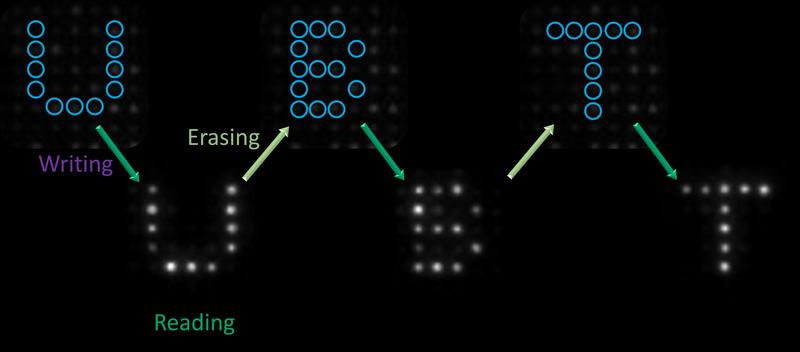| Sep 02, 2024 |
On the way to optical logic gates
(Nanowerk News) In a collaboration between scientists from Physics and Chemistry at the University of Bayreuth and Physical Chemistry at the University of Melbourne, it has now been possible to realize optically switchable photonic units that enable precise addressing of individual units. This will make it possible to reliably store and read binary information optically.
|
|
They report on this in the scientific journal Advanced Optical Materials ("Purely Optical, Reversible, Read-Write-Erase Cycling Using Photoswitchable Beads in Micropatterned Arrays").
|
 |
| The three letters U,B,T were sequentially written to the same position and read out. (Image: University of Bayreuth)
|
|
Electronic devices based on microchips, i.e. integrated circuits, are among the most important inventions of the last century, and their influence on everyday life is omnipresent. They are the basis of computers and modern telecommunications. The underlying circuits are a complex, networked system of logic gates that generate binary input and output signals controlled by electrons as signal carriers. A long-cherished dream is to develop logic gates in which signal transmission takes place using photons instead of electrons.
|
|
In an international collaboration, scientists from Bayreuth and Australia have now taken a first step in this direction.
|
|
Together, a team of Bayreuth colleagues, Prof. Dr. Jürgen Köhler and Prof. Dr. Mukundan Thelakkat (Applied Functional Polymers Group), Prof. Paul Mulvaney from the University of Melbourne, and junior scientists Dr. Heyou Zhang, Michael Philipp and Dr. Pankaj Dharpure have demonstrated the basics for the purely optical processing of information. They were able to perform hundreds of purely optical read, write and erase cycles on a grid of microstructured polymer spheres, in which the letters of the alphabet were written in succession on the same spot on a microstructured array.
|
|
Light offers more possibilities for multiplexing than electrons. “With light, you can use not only the signal strength (number of photons) but also the wavelength (color or frequency) or the polarization (direction of oscillation) to distinguish signals,” explains Prof. Dr. Jürgen Köhler, Chair of Soft Matter Spectroscopy at the University of Bayreuth. In the very distant future, this could one day form the basis for new photonic logic gates and microchips.
|

